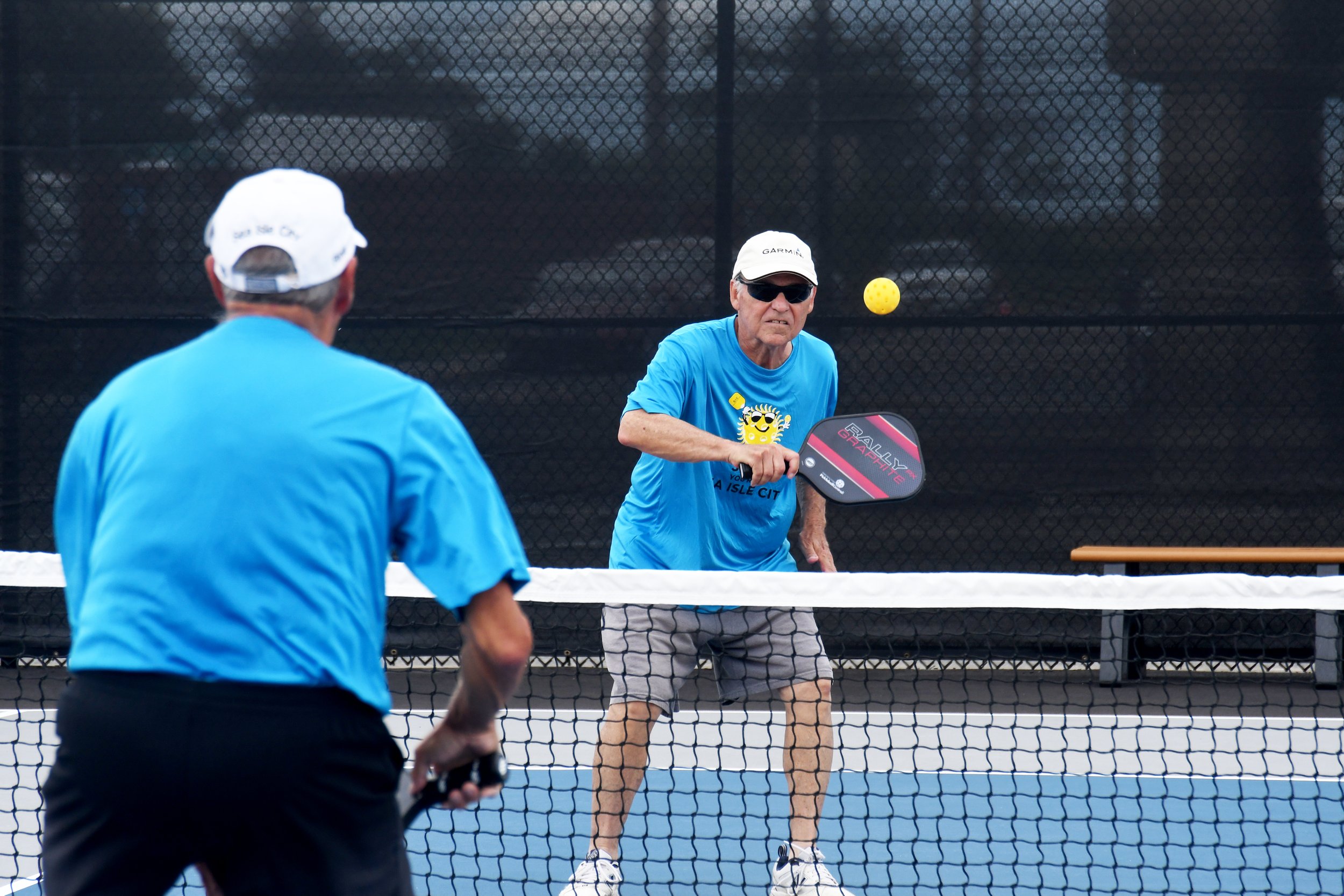Pickleball 101: Live to Pickle Another Day, Health Advice for the Pickleball Crowd
South Jersey and the Sea Isle City region have developed a solid membership in Pickleball Nation over the last decade, with thousands of locals playing the game on a growing number of courts in every community.
Why pickleball? The rallying cry is simple. Good exercise, social connections and just plain fun. The odd little game invented in the 1960s by three dads near Seattle to keep their kids occupied on summer weekends is now a worldwide phenomenon and the fastest-growing sport in the nation.
Despite the complaints by nonparticipants that the game makes a “rattling racket” and is consuming sports facility real estate formerly owned by tennis and basketball courts, the growing number of pickleballers seems to be gaining momentum.
U.S. pickleball participation increased by an annual average of 11.5% from 2016 to 2021, growing from close to 3 million players to nearly 5 million over that span, according to data provided by the Sports & Fitness Industry Association. The sport also seems to have grown as COVID-19 lockdowns encouraged recreational opportunities closer to home, with participation surging by nearly 40% from 2019-21.
Locally, in beach communities where boardwalks and sand and sea have attracted locals and visitors for decades, pickleball has established a year-round following. The pickleball world has held local tournaments and will host a Professional Pickleball Tour event in Avalon in September, the week following the end of the summer season.
The fitness benefits of playing pickleball are fairly easy to understand for anyone who enjoys sport for exercise. Heart and lung health along with improved muscle fitness and weight management are the obvious benefits of paddling around the court for just 30 minutes a day.
But with physical activity comes the chance of injury, especially when the pickleball becomes more competitive and intense. Local urgent care centers may be seeing an increase in weekend warriors from the pickleball wars.
Kris Gereaghty, the nurse manager at Cape Regional Urgent Care, is on the “front lines” to assist those with health issues and is a proponent of regular physical activities like pickleball.
“The fitness benefits of playing pickleball are both physical and mental,” Gereaghty says. “Physically, it is a great aerobic workout for all ages and skill levels, therefore improving cardiovascular health. It works joints and muscles with less strain than some other activities. Improved balance and cognitive function are additional benefits.”
Like many local players interviewed on the lure of the game, Gereaghty notes that “pickleball is a social sport, also promoting mental health. Spending time outdoors with others provides the opportunity for stress relief. And as with other sports, a match can boost self-esteem as your skills develop.”
With any physical activity, participants run the risk of injury. But preparation can help prevent serious problems.
“In our facility, there has not been an increase in pickleball-related injuries [as the number of players grows]. But some common injuries are strains, sprains, and breaks, pickleball elbow [aka tennis elbow] and shoulder injuries,” Gereaghty says.
Although not a “local” player, Jennifer Stone of Denville, N.J., personifies what the game has meant to millions who have found “new life” on the court. The 62-year-old has been playing pickleball four or five times a week for more than a year.
“My fitness has improved tremendously due to a motivation to play competitively, enjoy the game, and add new skills,” she says. “Like many people, I’m very surprised by how pickleball kick-started a love of movement. I now run, hike, trail run, swim, and bike more frequently. I feel like a kid again.”
Stone says the game has added to her flexibility and inspired her to pursue better health and fitness.
“I have returned to yoga, which I thought was kind of meaningless until I saw how it helped me reach forward for the ball at the non-volley zone line while avoiding the dreaded foot fault,” she says. “Increased flexibility has also enabled me to go after balls being hit down the line.”
Stone said she is learning tai chi and qigong to help focus with a positive energy state while playing pickleball.
“Getting involved in pickleball has changed my life massively,” she says. “I’m in better shape than I was from age 18 onward when I stopped figure skating competitively. In addition, I really want to be able to play this game into my eighties.”
Stone warns that several friends and fellow players have suffered injuries playing pickleball and she has tips for prevention.
“I have seen eye injuries, broken wrists, torn ACLs, back sprains, and twisted ankles,” she says. “Everyone should know that court shoes are a must. No running shoes. I never play without eye protection. I wear Oakley Radars indoors and out. Too few people do any warmup exercises or stretching prior to playing. I am one of those who won’t play before making sure that I’m limbered up and warmed up.”
Gereaghty said many injuries can be resolved with RICE: rest, ice, compression, and elevation. For more severe injuries, evaluation by a medical professional is needed and may require radiology studies to diagnose the problem.
“Prevent injuries by warming up before a match,” she says. “Stretch frequently used muscles. Don’t overdo it. Take it easy in the beginning and recognize physical limitations. Also, using the right paddle can also make the difference between a great game or an injury.”


